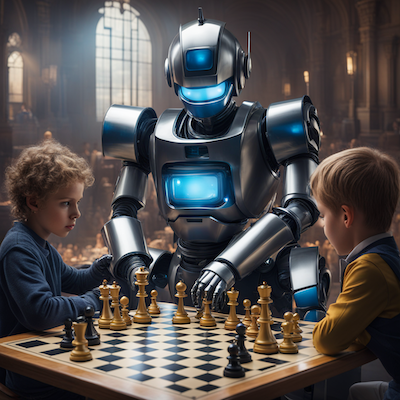
Wrote something about this with the title of AI Chess Coach talking about possibility of creating an AI chess coach some time last year when cool tools like text to image tools like MidJourney were starting to appear. Lost that article now because of the recent malware attack on my blog. But the gist of it was to use machine learning to build semblance of a human coach in digital form.
After more than a year, I still don’t see any tools or web-based companies creating anything close to what I was hoping for. Sure there are some using the cool catch phrase “Artificial Intelligence” in their marketing and one even in their domain name – ChessCoach.AI. But they are no more impersonal than a chess engine. Example. ChessCoach.AI (fee based typically USD 50/year) boasts of analysing an individual game and coming out with the best opening lines in that particular opening. That’s not any different for a student with today’s database like Megabase with Chessbase can do.
What I was visualisng was a system that analyses the individual games, recognises particular weaknesses. Remembers them. And then like a skilled and experienced doctor, prescribe the exercises, puzzles, questions etc to iron out those deficiencies and keep track of how well the student is doing learning to overcome personal obstacles.
I see now that may be a little too ambitious. So baby steps!
Instead of a full Chess Coach I’ll settle for an Chess Coach asssistant. One that will help the “real” human coach teach. Not any different from how universities use teaching assistants.
The mechanics of the AI tools like AI image generation, Deep Mind for chess, AI code generators, chat bots etc, is that they use a huge working database to learn from.. For example, Deep mind took a huge sample of games to learn how to play chess efficiently and become strong. A huge sample data is key.
For the AI Chess assistant, the source sample data is observing the interactions of a good human chess coach with a typical student. That can be gleaned from video recordings of teacher student sessions, chat transcripts if the lessons were done online and finally the actual recorded games of the students. The AI will learn from analysing hundreds if not thousands of such interactions to decide not only to immitate a good coach and possibly be better with susequent iterations and versions, improving on the quality of teaching and coaching over time.
To summarise this is what I think AI can do:
Learning from Human Coaching Interactions:
- AI can observe and analyze video recordings of online chess lessons to understand effective teaching strategies and techniques employed by human coaches.
- AI can identify patterns in coach-student interactions, such as the types of feedback provided, the use of questioning, and the timing of interventions.
- AI can incorporate these insights into its own coaching approach, adapting its style to emulate the effectiveness of human coaches.
Observing Coach-Student Communication:
- AI can analyze transcripts of chat conversations between coaches and students to identify effective communication patterns and language use.
- AI can learn how coaches explain complex chess concepts using clear and concise language, tailoring explanations to the student’s understanding.
- AI can incorporate these communication strategies into its own interactions with students, fostering better comprehension and engagement.
Understanding Student Learning Styles:
- AI can observe how coaches adjust their teaching methods based on individual student needs and learning styles.
- AI can identify patterns in student responses and adapt its coaching approach to cater to different learning preferences, such as visual, auditory, or kinesthetic styles.
- AI can personalize its feedback and recommendations based on the student’s unique strengths, weaknesses, and learning style.
Adapting to Coach Guidance:
- AI can receive real-time feedback from human coaches during joint coaching sessions, refining its approach based on the coach’s guidance.
- AI can seamlessly integrate with the coach’s teaching style, providing complementary support and reinforcement to the coach’s instruction.
- AI can continuously learn and improve from these interactions, enhancing its ability to provide effective coaching assistance.
Viability of AI Coach Assistants:
- Recent advancements in natural language processing (NLP) and computer vision enable AI systems to analyze and understand human interactions in real-time.
- The availability of online chess platforms and the vast repository of online chess lessons provide ample data for AI to observe and learn from human coaching interactions.
- The integration of AI coach assistants can augment the effectiveness of human coaches, allowing them to focus on higher-level strategic guidance and personalized mentoring.
Will this happen? As a computer nerd and programmer, I personally think it will. If it does, I can proudly go back to this post and tell people I thought of it first! But if not, then this will be the multitude of rubbish post I’ve written and classified as “brain farts” 🙂 So what do you think? Is this within the realm of possiblity?
